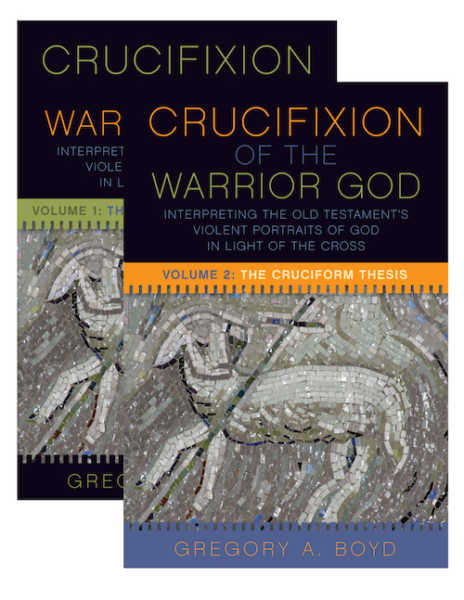We run our website the way we wished the whole internet worked: we provide high quality original content with no ads. We are funded solely by your direct support. Please consider supporting this project.

Crucifixion of the Warrior God Update
Did you know that authors generally don’t have much say-so about the cover art for their books? It’s considered part of the marketing, so the author may or may not like how it ends up looking. I’ve had a few book covers that made me scratch my head. (I won’t tell you which ones, but it would be fun to hear all of your guesses.) That being said, I’m thrilled with these covers, and I wanted to share them with all of you. So exciting!
Here’s the Fortress Press description:
A dramatic tension confronts every Christian believer and interpreter of Scripture: on the one hand, we encounter images of God commanding and engaging in horrendous violence: one the other hand, we encounter the non-violent teachings and example of Jesus, whose loving, self-sacrificial death and resurrection is held up as the supreme revelation of God’s character in the New Testament. How do we reconcile the tension between these seemingly disparate depictions? Are they even capable of reconciliation? Throughout Christian history, many different answers have been proposed, ranging from the long-rejected explanation that these contrasting depictions are of two entirely different ‘gods’ to recent social and cultural theories of metaphor and narrative representation.
The Crucifixion of the Warrior God takes up the dramatic tensions between depictions of divinely sanctioned violence and the message of peace centering the New Testament. Over two volumes, Gregory A. Boyd argues that we must take seriously the full range of Scripture and the centrality of the crucified and risen Christ as God’s supreme revelation. Developing a theological interpretation of Scripture involves what Boyd calls a cruciform hermeneutic. This reading leads us into the proper way of understanding the character of God, revealing God as loving, sacrificial, and subverting violence.
Category: General
Tags: Crucifixion of the Warrior God, Cruciform Theology
Related Reading

Podcast: Must We Believe in the Historicity of the OT Stories to Trust in the Bible and in Jesus?
Things get deep, literarily, as Greg discusses deep literalism. http://traffic.libsyn.com/askgregboyd/Episode_0384.mp3

If the violent depictions of God in the Bible are not completely accurate, isn’t all of Scripture up for debate?
Question: I’m very intrigued by your cruciform hermeneutics and can’t wait for your book (Crucifixion of the Warrior God) to come out. But I have to say that it strikes me as dangerous. You’re basically saying that the violent portraits of God in the OT are not completely accurate. But doesn’t this place us flawed…

Greg’s Interview on The Christian Transhumanist Podcast
Here is an interview I did for The Christian Transhumanist Podcast that I wanted to share with all of you. Micah Redding and I discuss everything from Relativity Theory to Politics. I think you’ll find it interesting, but I want to offer a word of clarification before you listen. At one point in this interview…

Was the Early Church Pacifistic? A Response to Paul Copan (#11)
In Crucifixion of the Warrior God (CWG) I argue that Jesus and Paul instruct Christians to love and bless their enemies and to unconditionally refrain from violence (e.g. Matt 5:39-45; Rom 12:14-21). Moreover, I argue that this was the prevailing attitude of Christians prior to the fourth century when the Church aligned itself with the…

Paul’s Blinding of Elymas: A Response to Paul Copan (#5)
In the first four posts in this “Response to Copan” series, I attempted to refute Copan’s claim that my non-violent understanding of love, as advocated in Crucifixion of the Warrior God (CWG) and Cross Vision (CV), conflicts with Paul’s quotation of violent Psalms, the praising of the faith of warriors in Hebrews 11:30-32, the longing…

A Cruciform Magic Eye
In this post I’d like to share the story of how I came upon the thesis I’m defending in the book I’ve been working on for the last four years entitled The Crucifixion of the Warrior God: A Cruciform Theological Interpretation of the Old Testament’s Violent Divine Portraits. It’s a much longer post than usual,…
